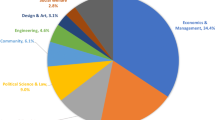Abstract
Base of Indian Economy is Rural India. There are many social issues which needs to be addressed. Though Indian Government is bringing many reforms, many policies but there is no optimum utilization of the same. Social entrepreneurs can play a predominant role in bringing this change in the economy by identifying the problem with a suitable solution. Through this Social Entrepreneurship and Rural Engagement programs, focus will be on guiding and supporting the students to fulfil their dreams of becoming successful entrepreneurs by framing initial action plans and put them to practice with active involvement of the student community, so that they can pursue their respective careers in entrepreneurship and also help the lesser endowed and privileged people to realize their dreams of becoming successful entrepreneurs. Secondly, this generation is very creative in resolving issues. Through this program, students would be generating opportunities themselves which can be availed by the less endowed people who have made aware and trained in particular areas of industry. Moreover, NGO’s contribution to resolving social issues will also be enhanced. Entrepreneurship-focused programs teach students crucial life skills that will help them navigate this uncertain future. These skills include problem-solving, teamwork, empathy, as well as learning to accept failure as a part of the growth process. Student entrepreneurs are creative individuals, regardless of whether they’re training to be an engineer or are performing as a stand-up comedian. Students always have a reputation for being radical, with each new generation demonstrating for the causes of the day and they proactively address real world problems by taking matters in to their own hands – and with the satisfaction of making a change themselves and bring solution. Students are strengthening energy for young entrepreneur for social enterprise.
Access this chapter
Tax calculation will be finalised at checkout
Purchases are for personal use only
Similar content being viewed by others
References
Bradley, T., Chakravarti, A.: What happened when the corporates met the artists of rural West Bengal? A critical analysis into art as social enterprise in India. J. South Asian Dev. 8(1), 85–104 (2013)
Calás, M., Smircich, L., Bourne, K.: Extending the boundaries: reframing entrepreneurship as social change through feminist perspectives. Acad. Manag. Rev. 34(3), 552–569 (2009)
Das, S., Mitra, A., Ali, M.H.: A study on the impact of women self-help groups (SHGs) on rural entrepreneurship development-a case study in selected areas of West Bengal. Int. J. Sci. Res. Publ. 5(3) (2015)
Datta, P.B., Gailey, R.: Empowering women through social entrepreneurship: case study of a women's cooperative in India. Entrep. Theory Pract. 36(3) (2012)
Kabeer, N.: Resources, agency, achievements: reflections on the measurement of women’s empowerment. Dev. Chang. 30(3), 435–464 (1999)
Kaur, R.: A detailed analysis of anand milk union limited (Amul) in India. Soc. Sci. Res. Pap. 4(2) (2014). ISSN - 2249- 555X
Mayoux, L.C.: Income generation for women in India: problems and prospects. Dev. Policy Rev. 7(1), 5–28 (1989)
Anjna, R.: Women spirit wins: a case study of Lijjat Papad. Int. J. Appl. Res. 2(2), 297–302 (2016)
Author information
Authors and Affiliations
Corresponding author
Editor information
Editors and Affiliations
Rights and permissions
Copyright information
© 2023 The Author(s), under exclusive license to Springer Nature Switzerland AG
About this paper
Cite this paper
Sandhya, T., Kandakatla, R., Reddy, G.S. (2023). Promotion of Social Entrepreneurship Among Higher Educational Institutions in India. In: Auer, M.E., Pachatz, W., Rüütmann, T. (eds) Learning in the Age of Digital and Green Transition. ICL 2022. Lecture Notes in Networks and Systems, vol 633. Springer, Cham. https://doi.org/10.1007/978-3-031-26876-2_98
Download citation
DOI: https://doi.org/10.1007/978-3-031-26876-2_98
Published:
Publisher Name: Springer, Cham
Print ISBN: 978-3-031-26875-5
Online ISBN: 978-3-031-26876-2
eBook Packages: Intelligent Technologies and RoboticsIntelligent Technologies and Robotics (R0)




